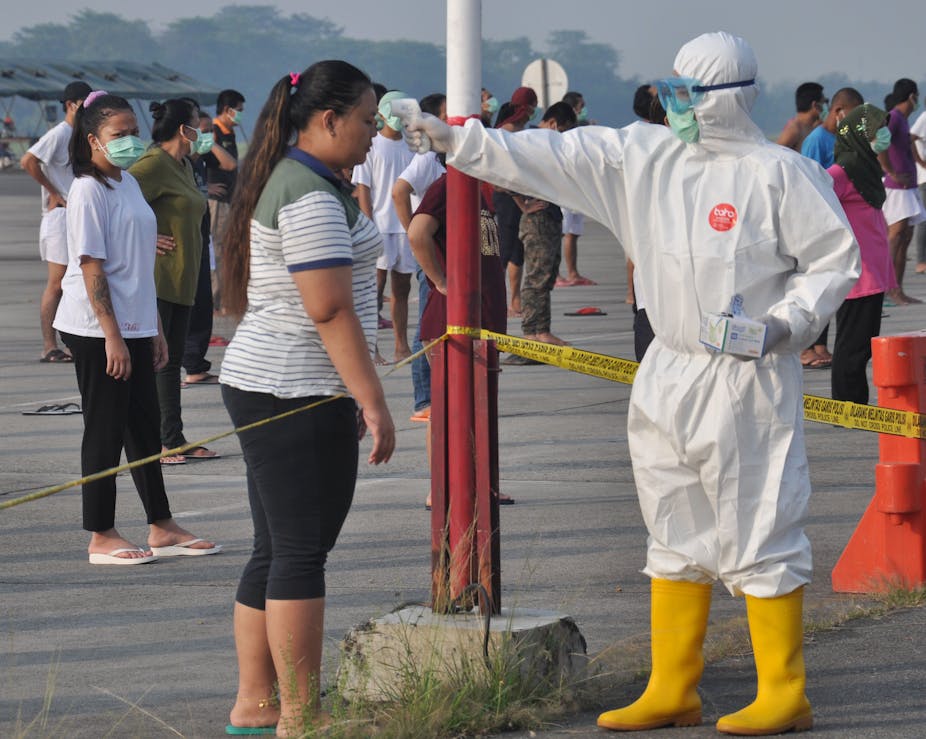Around 9 million Indonesians – more than the entire population of Switzerland – work abroad. Last year, they sent over US$11.7 billion back to Indonesia in the form of remittances.
However, the COVID-19 pandemic have caused losses to their families who depend on these remittances.
In 2020, the World Bank expects remittance flows to the region to decline by 13% due to the pandemic. That equates to about US$1.5 billion in remittances to Indonesia. Prior to the pandemic, remittances to Indonesia were already declining.
We investigated the impact of the pandemic on the families of migrant workers. We found most have lost income and have limited access to pandemic-related health care.
Limited access to health care
We surveyed 605 households (with 1,926 family members) in Sukowilangun village in Malang, East Java, the province with the highest number of migrant workers.
This was part of a research project funded by the United Kingdom Research and Innovation (UKRI) Grant.
Like many residents of rural areas of the archipelago, our respondents generally have sufficient access to housing and utilities, even though they are classified as poor in terms of income.
The majority (53%) of family members who claimed to have symptoms similar to COVID-19 said they did not get tested even though they had health insurance.
As many as 61% of families reported being members of BPJS, Indonesia’s national health insurance. Under the BPJS scheme, members pay a monthly premium of Rp 42,000 (about US$3) per person or Rp 200,000 (a little over $14) per family of four.
Only 6% of families with symptoms were tested.
The low testing of families of migrant workers corresponds to the state of pandemic health care throughout Indonesia.
During the pandemic, the proportion of the total Indonesian population who are infected and experiencing symptoms of COVID-19 is very low. More than 70% are categorised as asymptomatic carriers.
The government only gives health-care referrals and free testing to those who suffer from the symptoms for more than a week or based on a medical doctor’s request. The rate of testing is only around 18,600 per 1 million population.
Government testing, tracing and treatment during the pandemic are not carried out extensively in rural areas.
Read more: Delaying a COVID-19 vaccination program may cost Indonesia US$44 billion
Loss of income and jobs
Our respondents reported significant decreases in income in all types of work but especially those who work in the domestic sector such as farm labourers, shop assistants, daily wage workers in the informal sector, and those doing odd jobs. Many of them have lost their jobs.
Large-scale restrictions imposed by the government to prevent virus transmission caused these income and job losses.
Respondents working in the manufacturing, trade and services sectors also experienced decreases in income and are at risk of losing jobs.
Those with their own plot of farming land are the least impacted by the pandemic. Only 3% of them said they were affected by a decrease in income and loss of work.
Respondents reported a decrease in remittances during the pandemic. Some received no more money, some received half the usual amount, and some a little less than usual.
Families use remittances from relatives working abroad mostly for consumption, to pay for daily food, children’s education and health treatment for the elderly.
Few invest remittance money to buy a plot of land to farm as they do not see this as a profitable investment.
They consider farming to be less profitable than opening a small business or other productive activities that have a faster economic turnover. Examples include buying a car for transporting goods, opening a motorbike repair shop, and other small businesses.
Read more: How fintech can help Indonesia's small and medium enterprises survive the COVID-19 pandemic
Concern about migrant workers’ well-being
While facing difficulties at home, these families are also worried about their migrant worker relatives.
Many (41%) of them said they feared the workers could not return home because international borders were closed.
Some also expressed concern about security amid uncertainty about the process for those who want to return home or the situation in the workers’ host countries.
They also worry about virus infection and their relatives losing their jobs.
Hong Kong and Singapore are top destinations for Indonesian female migrants working in the domestic sector, especially as maids. Others work in the same field in Taiwan, United Arab Emirates and Saudi Arabia.
Migrants in the domestic sector have a higher risk of being affected by the pandemic, especially in Singapore and Hong Kong.
Singapore, once lauded for an exemplary response to the virus, faced problems when the virus reached its many marginalised foreign workers.
We see there is a problem where the information available to the migrants is inadequate, such as information on what they need to do to safely return home. This poor communication causes confusion, which is ultimately conveyed to the families back home.
Migrant families expect the government to provide information and communicate important steps in emergency situations to the migrant workers.
What the government needs to do
Families at home worry about the safety and protection of their relatives who are working abroad.
The Indonesian government and countries where Indonesians work need to improve the protection and legal certainty for migrant workers, help with travel arrangements and provide a network of crisis management centres during a pandemic.
The government should also help families back home manage remittances to become more financially resilient.
Many families spend remittances for consumption purposes and to open businesses that have low sustainability. Our research found migrant families who work in the agricultural sector have better resilience during a pandemic.
The government, in this case the Indonesian Ministry for Villages, Disadvantaged Regions and Transmigration, has an important role in ensuring migrant families make optimal use of remittances to boost income from agriculture, such as investing in lucrative local agricultural commodities.


